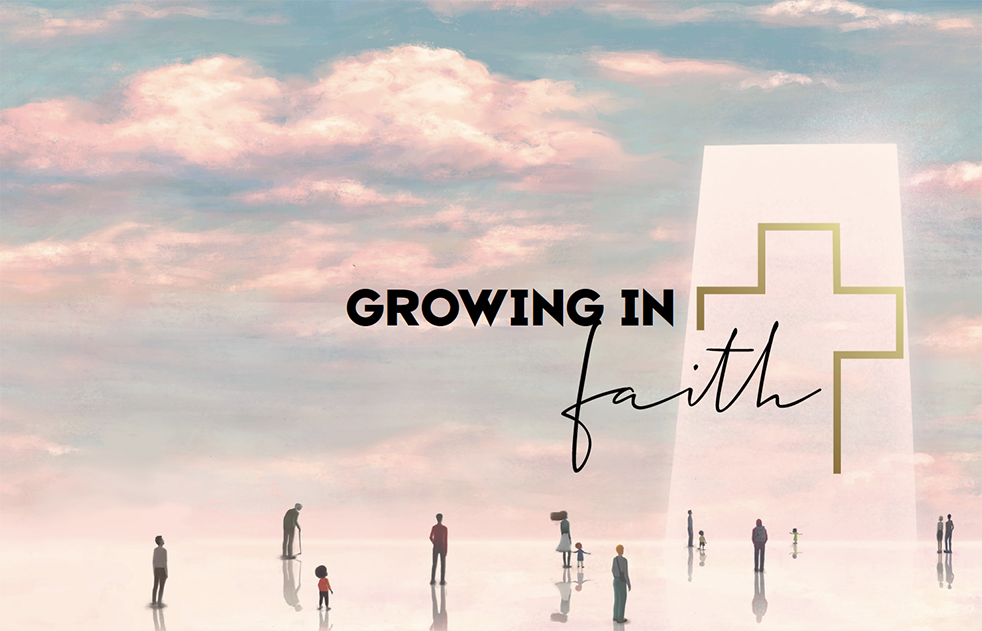美佳之窗 His Window 109( Jan - Mar 2025 )主流话题
Text by Rev. Matthew

The Christian faith is characterised by one thing — growth. To be a Christian is to grow in the faith. Our Christian faith, just like our physical bodies, has the capacity and capability for growth. Feed it well, it grows strong and healthy. Nourish your spiritual lives well, and we will have a strong faith. However, while this is common knowledge, it is not common practise and sad to say, some Christians neglect this aspect of growth in their spiritual lives. The result is a Christian that barely knows the word of God, continues to live in sin, and is only Christian by religion. Therefore, why and how can we grow in our faith? Let us look to Colossians 1:1-8 to understand more.
1. Understanding Christ’s Lordship (1:1)
When we read the opening sentence of Paul’s letter to the Colossian Christians, we can certainly gain some valuable insights into Paul’s maturity as a Christian first, and a leader of the church next. Paul writes that he is an “apostle of Jesus by the will of God…” This statement carries the definition and implication that Paul is not an apostle of his own doing. Rather, he is an apostle because Christ appointed him. Paul can be an apostle to the church because Christ gave him this position to serve Him and the church. As Paul writes this, he is also saying that because Christ appointed and ordained him into the ministry, thus, Christ is the master, and he is merely the servant. Paul recognises and honours the lordship of Christ in his life, and his ministry is a declaration of Christ’s work through him, not his own work. Such is a characteristic of a Christian who is mature. It is a person who recognises and understands the lordship of Jesus Christ in their lives. It is a Christian who lives his life to do the will of God and it is a Christian who most certainly commits to be a servant of God the rest of their lives.
When we speak of maturity, we cannot start anywhere else but with the position of God in our lives. Because when God is positioned in the right place of our hearts and lives, everything else will fall into place. When God is the first and centre of our life, we will ensure nothing will take the place of God. When God is the first and centre of our life, then our pursuits will be in line with God’s will. When God is first, our pride will be subdued and surrender to God will become the theme of our lives. To endeavour to grow as a Christian is to first and foremost put God in the centre of your life. Understand the lordship of Jesus in your life, surrender to God’s will, let God be God in your life.
2. Understanding Partnership (1:1b)
A Christian who wants to grow in faith, understands the importance of spiritual partnerships. In the very same opening verse, Paul writes something very interesting towards the end, “Paul, an apostle of Christ Jesus, by the will of God, and Timothy our brother…” He does not just acknowledge himself as an apostle appointed and ordained by God, but also includes Timothy in the picture. In other words, Paul’s ministry is also “approved” by Timothy, the young pastor. Who was Timothy that Paul needed his approval? Wasn’t Timothy Paul’s understudy? Wasn’t it Paul who approved of Timothy’s ministry, not vice versa? When Paul writes about the “approval” of Timothy, it is not in the sense of having his career based on Timothy’s approval of him. Rather, Paul was speaking of approval in the sense of partnership with Timothy. Paul was informing the Colossian Christians that his decisions were decided and shared with Timothy. Paul was informing the Christians that as much as he gave advise to Timothy, he also welcomed Timothy’s advise. Paul was also informing the Christians that just as he holds Timothy accountable, Timothy holds Paul’s life and ministry accountable before God and men. Paul, in a single sentence, was describing the kind of ministry that did not operate in a silo, rather a ministry that was mature, that understood the importance of partnership and accountability.
A Christian that endeavours to be mature in faith must value spiritual partnerships. We cannot just say, “I have Jesus, it is enough.” Sometimes, this statement is not a demonstration of great spirituality, but, that of pride and ignorance towards the work of the devil. A Christian who rejects spiritual partnership is treading dangerously through their spiritual life and is at greater risk of falling away from the faith. To mature in the faith is to appreciate the people God sends to our life to hold us accountable. These are the people that will point out our mistakes or show us the way when we cannot see the right way. These are people that do not only have their own interests in sight, but your interests as well. Most importantly, these are people who will build up your faith even stronger than what it used to be. Appreciate the spiritual partners God places in your life. And if you do not have one yet, pray, ask God to lead people into your life so that you can grow even stronger in the faith. A maturing Christian is one who does not go through life in a silo.

3. Understanding Christian Devotion (1:3-8)
A Christian who is growing demonstrates Christian devotion. In Colossians 1:4, Paul writes that he is thankful to God for he has heard of their “faith in Christ Jesus and of the love that you have for all the saints.” This sentence informs us that the Colossian Christians were active in their worship and also their works. For Paul to hear of their faith and works from house prison meant that the Colossian Christians were really different. For news of the Colossian Christians to travel to Paul, a person who had no prior knowledge or interaction with the Colossian church, meant that the Christians made a lasting and meaningful impact in their city and in the lives of those who came in contact with them. The picture of the Colossian church from just this one verse alone is a picture of a church that valued and upheld the discipline of worship and study of the Scriptures. This verse also informs us that their worship was not just religious, but it was vibrant and transformative. More than that, verse 4 also paints a picture of a church that did not just meet to worship and disperse without translating their worship to their everyday lives. The Christians worshipped God in church and lived a life of worship outside of the church. They allowed their worship of God to transform their lives, in turn, transforming the community around them. They experienced Christ’s love and grace through worship in church and in turn, they showed Christ’s love to the people around them. A church active in faith and works is a church whose Christians are growing healthily in the faith.
When we speak of growth, we cannot neglect worship and works. Worship is the time we spend in church and outside of church doing the basics of Christianity — prayer, singing, and studying God’s word. Worship is important as it draws us closer to God, allows us to experience God’s presence in our lives, and increases our knowledge of God himself. But, worship cannot just remain a spiritual act. Worship must be practical. Worship must be transformative and only when we take the experience and spiritual knowledge and apply it to our daily lives, will worship be transformative. As we worship, our hands must be ready to help those in need. As we worship, our experience of God must stir up greater compassion in our hearts for people around us. As we worship, our lives must radiate more and more with the grace of Jesus Christ. Such is the mark of a mature, growing Christian, one who knows how to worship and who also lives a life of worship daily.
Conclusion
In this new year, can we embark on this Christian goal to grow in our faith? The small steps forward we take with God, can bring about the greatest transformation to our lives. This transformation will certainly take you on a different level with God and also bring transformation to the people around you.

Rev. Matthew